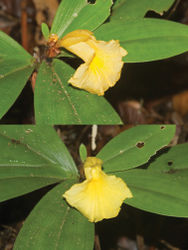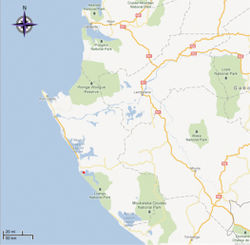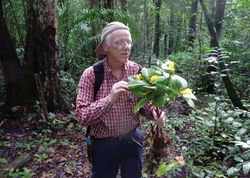Difference between revisions of "Costus loangensis"
m (Imported from PhytoKeys) |
m (1 revision) |
(No difference)
| |
Latest revision as of 13:03, 19 November 2012
| Notice: | This page is derived from the original publication listed below, whose author(s) should always be credited. Further contributors may edit and improve the content of this page and, consequently, need to be credited as well (see page history). Any assessment of factual correctness requires a careful review of the original article as well as of subsequent contributions.
If you are uncertain whether your planned contribution is correct or not, we suggest that you use the associated discussion page instead of editing the page directly. This page should be cited as follows (rationale):
Citation formats to copy and paste
BibTeX: @article{Kamer2012PhytoKeys18, RIS/ Endnote: TY - JOUR Wikipedia/ Citizendium: <ref name="Kamer2012PhytoKeys18">{{Citation See also the citation download page at the journal. |
Ordo: Zingiberales
Familia: Costaceae
Genus: Costus
Name
Costus loangensis H. Maas & Maas sp. nov. – Wikispecies link – IPNI link – Pensoft Profile
Diagnosis
Costus loangensis (Fig. 1) is a short-stemmed (about 0.5 m tall) plant with few (6–7) leaves and with completely yellow flowers. Stems and leaves are covered with a dense indument of erect to half-appressed hairs. Costus loangensis differs from Costus spectabilis (Fenzl) K.Schum., another short-stemmed yellow-flowered species, by having a well developed aerial stem. Costus spectabilis inhabits savannas and has only 4 leaves that remain strongly pressed to the ground. Costus loangensis differs from Costus ligularis Baker, also a short-stemmed and indumented plant, by the colour of its flowers (Costus ligularis has a pale pink flower) and the length of the calyx (5-7mm in Costus ligularis v. 11–12mm in Costus loangensis) (Table 1). {| class="wikitable" ; style="width: 100%" |+ Table 1. Use of characters to differentiate Costus loangensis from other African species with similar morphological characters. |- ! Species !! Flower color !! Stem height !! Bract appendage |- | Costus loangensis || yellow || 0.5m || No |- | Costus spectabilis || yellow || 0m || No |- | Costus ligularis || pale pink to white || 0.5m || No |- | Costus gabonensis || yellow || 1.5m || Yes, red/brown reflexed |}
Type
P.J.M. Maas, F.J. Breteler, C.D. Specht, H. Maas-van de Kamer, R. Niangadouma 10184 (holotype WAG; isotypes K, LBV, MO, UC), Gabon, prov. Ogooué-Maritime: Parc Nacional de Loango, between Lodge and Staff building, 1°54'43.3"S, 9°19'33.6"E, wet forest on white sand, along forest trail, at about sea level, 9 November 2011.
Description
Terrestrial herb, 0.5–0.6 m tall, stems dark brownish red. Leaves: dark olive-green, several (6–7) concentrated at the apex of the stem; sheaths dark red, 0.6–0.8 cm diam.; ligule green, 2-lobed, 15–18 mm long, membranous; petiole 5–6 mm long; sheaths sparsely to rather densely covered with erect to half-appressed hairs ca. 2 mm long, ligule and petiole densely to rather densely so; lamina narrowly elliptic to elliptic, 14–16 by 5–6 cm, densely to rather densely covered with erect to half-appressed hairs 1.5–2 mm long on both sides, zone along midrib sometimes reddish, base attenuate, apex acute. Inflorescence: 3–5-flowered, ovoid, 2 by 1–1.5 cm, terminating the leafy stem; outer side of bracts, bracteoles and calyx densely covered with appressed to half-appressed hairs ca. 0.2 mm long, ovary sparsely so. Flower: 1 per bract; bracts brown to reddish brown, chartaceous, narrowly ovate-triangular to ovate-triangular, 1.7–2 by 0.5–1 cm, callus 2.5–3 mm long; appendages absent; bracteole reddish, boat-shaped, 15–18 mm long, callus 1.5–2 mm long; calyx reddish to greenish, 11–12 mm long, lobes deltate, ca. 2 mm long, callus ca. 1 mm long; corolla yellow, 50–55 mm long, tube 20–25 mm long, lobes narrowly elliptic, 30–35 mm long, outer side rather densely covered with half-appressed hairs ca. 1 mm long particularly near the apex, together forming a hood over the throat opposite the labellum, apex with a callus-like thickening; labellum yellow, horizontally flattened with funnel-shaped base, broadly obovate when spread out, 30–40 by 40–50 mm, margin fimbriate (fimbriae 2–3 mm long); stamen yellow, 25–30 by 7–10 mm, apex reflexed, anther 5–7 mm long; ovary narrowly obovoid, ca. 6 mm long, stigma bilamellate, dorsal appendage 2-lobed. Fruit and seeds not seen.
Distribution
Gabon (Fig. 2). Only known from the type location.
Habitat and ecology
In wet forest, on white sand soil under rain forest canopy (Fig. 3). Elevation just above sea level. Flowering: November; fruiting: unknown.
Phylogenetic relationship
Based on a combined 4 molecular marker (CAM, ITS, ETS, rpb2) phylogenetic analysis with taxon sampling that included African species in the genus Costus, Costus loangensis H. Maas & Maas is found to be well supported as sister to a clade of Costus ligularis Baker specimens (Fig. 4). Costus loangensis fits within the general distribution range of Costus ligularis, however no populations of Costus ligularis were found in sympatry. Costus loangensis is restricted in elevation to just above sea level, while Costus ligularis is commonly found 0–600m above sea level throughout low-elevation rain forests in Cameroon and Gabon. {| class="wikitable" ; style="width: 100%" |+ Table 2. List of collections included in phylogeny to place Costus loangensis sp. nov. |- | Costus || Costus afer || L87-0185 |- | Costus || Costus afer || M10205 |- | Costus || Costus albiflos || M10411 |- | Costus || Costus dubius || M10206 |- | Costus || Costus dubius || GH89-0918 |- | Costus || Costus aureus || M9302 (vouchered from Burger’s Bush) |- | Costus || Costus lucanusianus || M10000 |- | Costus || Costus lucanusianus || L87-0286 |- | Costus || Costus ligularis || M10329 |- | Costus || Costus ligularis || M10267 |- | Costus || Costus ligularis || BB 1998-0923003 |- | Costus || Costus lateriflorus || M9995 |- | Costus || Costus lateriflorus || M10331 |- | Costus || Costus lateriflorus || GH98-224 |- | Costus || Costus spectabilis || GH96-284 |- | Costus || Costus gabonensis || M10291 |- | Costus || Costus gabonensis || CS02-339 |- | Costus || Costus tappenbeckianus || M10226 |- | Costus || Costus tappenbeckianus || GH94-628 |- | Costus || Costus talbotii || BB 2003-0109009 |- | Costus || Costus phyllocephalus || M10389 |- | Costus || Costus phyllocephalus || L87-0057 |- | Costus || Costus phyllocephalus || BB 2001-0402004 |}
Vernacular names
Not recorded. This plant seems to go unnoticed by the local population and has no known uses.
Etymology
Costus loangensis is named after the place where it was photographed and now has been collected and documented for the first time: near the Loango Lodge, in “Parc Nacional de Loango” in Gabon.
Original Description
- Kamer, H; Maas, P; Specht, C; 2012: Costus loangensis, an exciting new species from Gabon, Africa PhytoKeys, 18: 11-18. doi
Other References
Images
|
- ↑ Guindon S, Gascuel R (2003) PhyML: A simple, fast and accurate algorithm to estimate large phylogenies by maximum likelihood. Systematic Biology 52 (5): 696-704. doi: 10.1080/10635150390235520
- ↑ Johansen L (2005) Phylogeny of Orchidantha (Lowiaceae) and the Zingiberales based on six DNA regions. Systematic Botany 30 (1): 106-117. doi: 10.1600/0363644053661931
- ↑ Specht C (2006a) Systematics and Evolution of the tropical monocot family Costaceae (Zingiberales): a multiple dataset approach. Systematic Botany 31 (1): 88-108. doi: 10.1600/036364406775971840



![Figure 4. Phylogeny of African Costus species (Table 2) including newly described Costus loangensis. The phylogeny was constructed in PhyML (Guindon and Gascuel 2003[1]) with aligned sequence data for two low copy nuclear markers [calmodulin (cam) intron (Johansen 2005[2]) and rpb2 (Specht 2006a[3])] and nrDNA markers ITS and ETS. All nodes indicated have >50% bootstrap support.](https://species-id.net/o/thumb.php?f=PhytoKeys-018-011-g004.jpg&width=250)